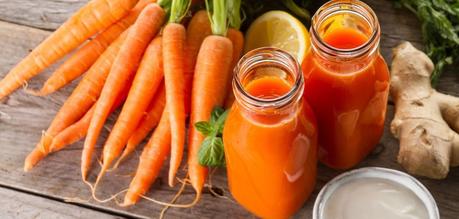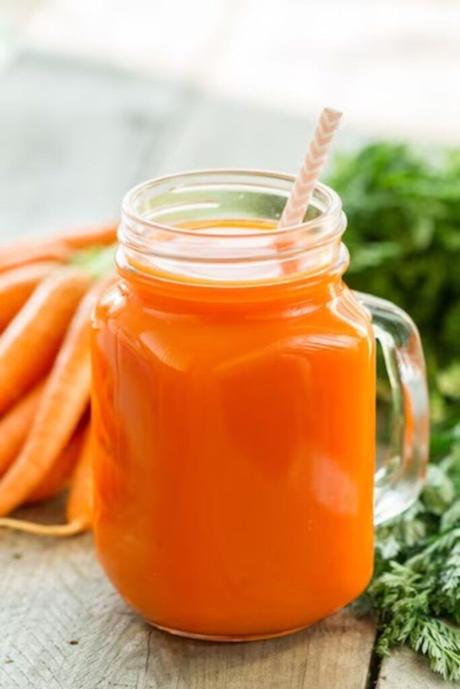
Obtained from whole carrots, carrot juice is an incredibly nourishing beverage that delivers numerous health benefits. Packed with crucial vitamins and minerals such as provitamin A, vitamin C, and potassium, it becomes an enjoyable incorporation into any diet. Explore the numerous benefits that carrot juice can offer with these eight solid reasons.
1. Powerhouse Of Nutrients
Low in calories and carbs, carrot juice is a rich source of essential nutrients. Just one cup (236 grams) contains:
- Calories: 94
- Fiber: 0.8 g
- Protein: 2 grams
- Calcium: 24 mg
- Iron: 0.46 mg
- Magnesium: 14 mg
- Phosphorus: 42 mg
- Carbohydrates: 9.28 g
- Sugars: 3.91 g
- Vitamin A: 956 µg
- Vitamin B6: 0.217
- Vitamin C: 8.5 mg
- Vitamin E: 1.16 mg
- Vitamin K: 15.5 µg
- Potassium: 292 mg
- Folate: 4 µg
- Zinc: 0.18 mg
- Copper: 0.046 mg
- Beta-Carotene: 9300 µg
- Lutein + Zeaxanthin: 333 µg
Furthermore, carrot juice possesses valuable carotenoid pigments like lutein and zeaxanthin that act as potent antioxidants to counteract detrimental free radicals.
The primary carotenoid in carrot juice is beta-carotene, which not only lends the orange color to carrots but also converts into the antioxidant vitamin A in your body.

2. Promotes Eye Health
Carrot juice is a remarkable resource of nutrients that fosters optimal eye health. By providing more than 250% of the recommended DV for vitamin A per cup, predominantly in beta-carotene form, it delivers essential nourishment to keep your eyes functioning properly.
Research has established a connection between consuming fruits and vegetables that are high in provitamin A and a lower likelihood of developing eye diseases and blindness associated with aging.
Furthermore, the juice provides lutein and zeaxanthin, two carotenoids that accumulate in your eyes, offering protection against damaging light. The use of these compounds has been associated with a lower risk of encountering eye complications, including age-related macular degeneration (AMD).
3. Potential Anticancer Effects
Investigations performed on test tubes proposed that distinct components present in carrot juice might provide protection against cancer. The presence of beta-carotene, polyacetylenes, and lutein in the juice could potentially combat certain types of human cancer cells.
These results indicate promise, but it is necessary to conduct more extensive human research before embracing carrot juice as a possible remedy for cancer.
4. Boosts Immune System
By combining vitamins A and C, carrot juice provides strong antioxidant effects that safeguard immune cells from the harmful impact of free radicals.
Additionally, the juice provides a notable dose of vitamin B6, which is necessary for supporting optimal immune function. Deficiency in vitamin B6 can weaken immunity, affecting the production and growth of immune cells.
5. Supports Skin Health
Carrot juice contains important nutrients that contribute to the health and radiance of the skin. With over 20% of the DV for vitamin C in one cup, carrot juice supports collagen production, a crucial protein for skin elasticity and strength.
Additionally, vitamin C serves as an antioxidant, defending the skin from damage inflicted by free radicals. By preventing UV damage and enhancing overall appearance, beta-carotene in carrot juice offers potential benefits for skin health.
6. Improved Heart Health
Consuming carrot juice might aid in lowering the risk factors connected to heart disease. Having a rich potassium content, it assists in the management of blood pressure, potentially safeguarding against hypertension and stroke.
More human research is necessary to fully confirm that the antioxidant compounds in the juice have heart-protective benefits.
7. Aids In Blood Sugar Management
Certain research indicates that limited consumption of carrot juice may contribute to lower levels of blood sugar. The inclusion of beneficial probiotics in fermented carrot juice has exhibited promise in decreasing blood sugar and positively impacting related markers.
Furthermore, the anthocyanin pigments in purple carrot juice have been discovered to promote better blood sugar regulation through their anti-inflammatory properties. More studies are needed to ascertain if these effects are relevant to regular carrot juice.
8. Promotes Liver Health
Studies suggest that the carotenoids in carrot juice have anti-inflammatory and antioxidant effects, potentially promoting liver health.
Carrot juice may offer protection against nonalcoholic fatty liver disease (NAFLD), which can lead to liver damage due to unhealthy nutrition, excess weight, or obesity.
Despite the promising outcomes of rodent studies, additional research with human participants is required to confirm these advantages.
Carrot Juice Side Effects
Although considered safe, it is important to take some precautions when drinking carrot juice. Pregnant individuals, older adults, young children, and those with compromised immune systems should avoid unpasteurized carrot juice to prevent harmful bacteria consumption.
Drinking excessive amounts of carrot juice may lead to carotenemia, a condition that temporarily turns the skin yellow-orange due to high beta-carotene levels in the blood.
The key is moderation, especially for individuals with diabetes, as carrot juice still has natural sugars that can potentially influence blood sugar levels.
Conclusion
Carrot juice is an incredibly nutritious and wholesome elixir with numerous health benefits. Incorporating this nourishing beverage in moderation can complement your overall well-being.
As with any dietary change, it's essential to consult your healthcare provider if you have specific health concerns or conditions.
REFERENCES:
- Carrot juice, canned; FoodData Central.
- Lutein and Zeaxanthin-Food Sources, Bioavailability and Dietary Variety in Age-Related Macular Degeneration Protection; Author: Bronwyn Eisenhauer and Sharon Natoli; PMCID: PMC5331551, PMID: 28208784.
- Nutrients for Prevention of Macular Degeneration and Eye-Related Diseases; Authors: Hock Eng Khoo and Hui Suan Ng; PMCID: PMC6523787, PMID: 30986936.
- Lutein and Zeaxanthin and Their Roles in Age-Related Macular Degeneration-Neurodegenerative Disease; Authors: Małgorzata Mrowicka, Jerzy Mrowicki; PMCID: PMC8874683, PMID: 35215476.
- Dietary nutrient intake and progression to late age-related macular degeneration in the Age-Related Eye Disease Studies 1 and 2; Authors: Elvira Agrón, Julie Mares; PMCID: PMC7902480, NIHMSID: NIHMS1624410, PMID: 32858063.
- Role of Vitamin A in the Immune System; Author: Zhiyi Huang; PMCID: PMC6162863, PMID: 30200565.
- Vitamin C and Immune Function; Author: Anitra C. Carr; PMCID: PMC5707683, PMID: 29099763.
- Lutein and zeaxanthin intake and the risk of age-related macular degeneration: a systematic review and meta-analysis; Authors: Le Ma, Hong-Liang Dou; PMID: 21899805.
- Effects of Vitamin B6 Deficiency on the Composition and Functional Potential of T Cell Populations; Author: Bingjun Qian; PMCID: PMC5358464, PMID: 28367454.
- Dietary polyacetylenes, falcarinol and falcarindiol, isolated from carrots prevents the formation of neoplastic lesions in the colon of azoxymethane-induced rats; Author: Morten Kobaek-Larsen; Issue 3, 2017.
- In vitro anti-proliferative activity of selected nutraceutical compounds in human cancer cell lines; Author: Endalkachew Nibret; PMCID: PMC7791773, PMID: 33413604.
- Lutein inhibits breast cancer cell growth by suppressing antioxidant and cell survival signals and induces apoptosis; Authors: Yogendra Prasad Kavalappa, Sowmya Shree Gopal; First published: 24 July 2020, Citations: 23.
- Fermented carrot juice attenuates type 2 diabetes by mediating gut microbiota in rats; Author: Rongkang Hu; PMID: 31070649.
- The Roles of Vitamin C in Skin Health; Authors: Juliet M. Pullar, Anitra C. Carr; PMCID: PMC5579659, PMID: 28805671.
- Role of ingestible carotenoids in skin protection: A review of clinical evidence; Author: Sudhir M. Baswan; Received: 15 June 2020, Revised: 5 March 2021, Accepted: 3 May 2021.
- Beneficial Effects of High Potassium; Author: Alexander Staruschenko.
- Carotenoids and non-alcoholic fatty liver disease; Authors: Bahiddin Yilmaz, Kazim Sahin; PMCID: PMC4465602, PMID: 26151056.
- Carrot Juice Administration Decreases Liver Stearoyl-CoA Desaturase 1 and Improves Docosahexaenoic Acid Levels, but Not Steatosis in High Fructose Diet-Fed Weanling Wistar Rats; Authors: Malleswarapu Mahesh, Munugala Bharathi; PMCID: PMC5063201, PMID: 27752492.

